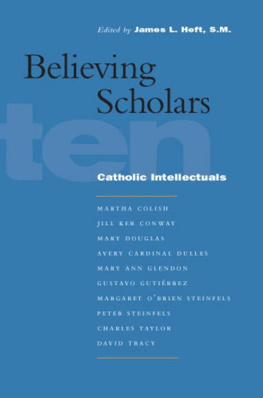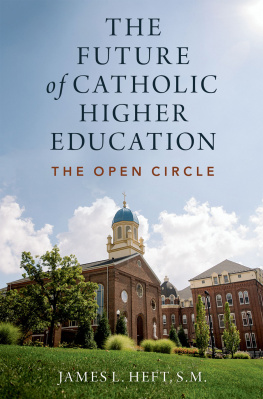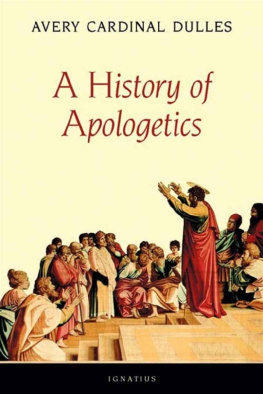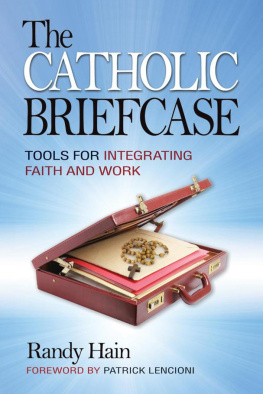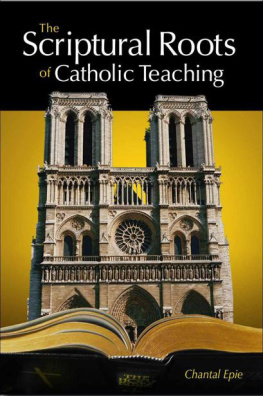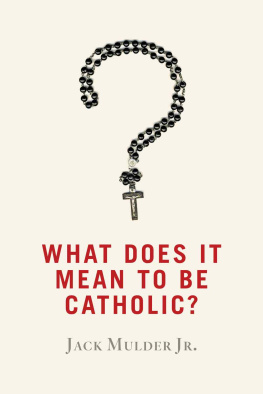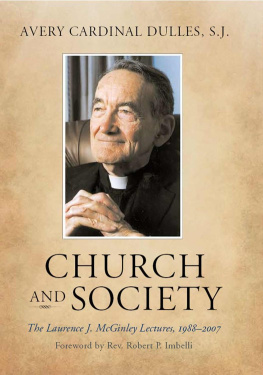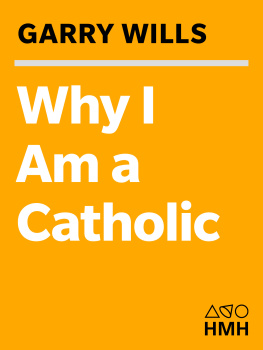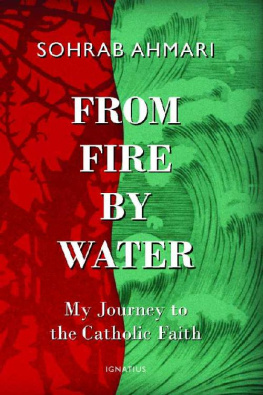
B E L I E V I N G S C H O L A R S
................. 11475$
$$FM
08-02-05 13:59:39
PS
PAGE i
The Abrahamic Dialogues Series
David B. Burrell, series editor
Editorial Board
Ibrahim Abu-Rabi, Hartford Seminary
Susannah Heschel, Dartmouth College
Donald J. Moore, S.J., Fordham University
1. James L. Heft, ed., Beyond Violence: Religious Sourcesof Social Transformation in Judaism, Christianity, and Islam. 2. Rusmir Mahmutchajic, Learning from Bosnia:Approaching Tradition
................. 11475$
$$FM
08-02-05 13:59:40
PS
PAGE ii
believing scholars
Ten Catholic Intellectuals
Edited by
j a m e s l . h e f t, s . m .
Fordham University Press, New York, 2005
................. 11475$
$$FM
08-02-05 13:59:40
PS
PAGE iii
Copyright 2005 Fordham University Press
All rights reserved. No part of this publication may be reproduced, stored in a retrieval system, or transmitted in any form or by any meanselectronic, mechanical, photocopy, recording, or any otherexcept for brief quotations in printed reviews, without the prior permission of the publisher.
A Catholic Modernity? from A Catholic Modernity? Charles Taylors MarianistAward Lecture by Charles Taylor, edited by James L. Heft, copyright 1999 by Oxford University Press, Inc. Used by permission of Oxford University Press, Inc. The Abrahamic Dialogues Series, No. 3
ISSN 15484130
Library of Congress Cataloging-in-Publication Data Believing scholars : ten Catholic intellectuals / edited by James L. Heft.
1st ed.
p.
cm.
Includes bibliographical references and index.
ISBN 0-8232-2525-9 (hardcover) ISBN 0-8232-2526-7 (pbk.) 1. Catholic ChurchDoctrines. I. Heft, James.
BX1751.3.B45 2005
230.2dc22
2005016812
Printed in the United States of America
07 06 05
5 4 3 2 1
First edition
................. 11475$
$$FM
08-02-05 13:59:40
PS
PAGE iv
Contents
Preface and Acknowledgments
vii
james l. heft, s.m.
Introduction
Catholic Intellectuals: No Ivory Tower
james l. heft, s.m.
1. A Catholic Modernity?
charles taylor
2. The Poor and the Third Millennium
gustavo gutierrez
3. Forms of Divine Disclosure
david tracy
4. Memoirs and Meaning
jill ker conway
5. Catholic and Intellectual: Conjunction or Disjunction?
marcia l. colish
6. Catholicism and Human Rights
mary ann glendon
7. A Feeling for Hierarchy
mary douglas
8. My Life as a Woman: Editing the World
margaret obriensteinfels
9. Liberal Catholicism Reexamined
peter steinfels
................. 11475$
CNTS
08-02-05 13:59:43
PS
PAGE v
Contents
vi
10. The Faith of a Theologian
avery cardinal dulles, s.j.
Notes
Contributors
Index
................. 11475$
CNTS
08-02-05 13:59:43
PS
PAGE vi
Preface and Acknowledgments
james l. heft, s.m.
I n anypublished work of thissort, manypeople have participated. I wish here to acknowledge several individuals who have made the Marianist Awards possible. First, thanks for the educational vision and administrative skills of Bro. Ray Fitz, S.M., the president of the University of Dayton for twenty-three years (19792002), and to his successor Dr. Daniel Curran, for continued support of this award. Thanks also to the Ofce of the Rector of the University, most recently directed by Fr. Eugene Contadino, S.M., for its contributions to various details of organization that made the visits of the Marianist awardees graceful occasions. And thanks to Ms. Carol Farrell, my assistant, who also helped with many of the details of the events surrounding these lectures, and the various receptions and dinners connected with them. Ms. Farrell also assisted me in the preparation of these lectures for publication. Thanks to Donald Wigal who prepared the excellent index for this volume. I wish nally to express appreciation for Marianist educational traditions that bring together head and heart, theory and practice, leadership and service, and work to overcome many of the unfortunate dichotomies that characterize our lives and our institutions. Marianist brothers and priests live together as equals and collaborate with Marianist sisters and lay persons to create learning environments for Catholic education and leadership. I have been personally blessed to enjoy such an environment at the University of Dayton for over a quarter of a century. Fr. James L. Heft, S.M.
January 28th, Feast of St. Thomas Aquinas
................. 11475$
PREF
08-02-05 13:59:50
PS
PAGE vii
................. 11475$
PREF
08-02-05 13:59:50
PS
PAGE viii
i n t r o d u c t i o n
Catholic Intellectuals: No Ivory Tower
james l. heft, s.m.
N early a decade ago, the rst volume of Marianist Award lectures appeared in print.1 In the preface to that volume, I explained how the University of Dayton, founded by the Marianists (Society of Mary) in 1850, had been giving since 1950 an annual award to a leading Mariologist. Some years after the Second Vatican Council, during a period when many Marian practices fell into desuetude, so did the granting of this annual award. However, the commitment of the university to the support and continued development of its Marian Library remained rm. For example, the leaders of the university and of that library, especially Fr. Theodore Koehler, S.M., established in 1975 the International Marian Research Institute which, in conjunction with the Marianum in Rome, grants pontical degrees in the eld of Mariology. In the mid-1980s the university decided to reinstitute the annual award, but with a slightly different focus: the award would be given to a Catholic intellectual who has made a major contribution to the intellectual life. Recipients were asked to speak about their faith and how it has inuenced their scholarship, and how their scholarship has inuenced their faith. Some of these Marianist Award lectures have been cited elsewhere, and sometimes even reprinted.2 In this introduction, I will touch upon three themes that are critically important for understanding the situation of a Catholic tradition four decades after the Second Vatican Council and ve years into the third millennium. The three themes that seem to have gained the greatest importance
................. 11475$
INTR
08-02-05 13:59:53
PS
PAGE 1
Introduction
since the rst volume of Marianist lectures was published are the following: (1) the Church as a community that both teaches and learns; (2) how people of faith fare in the academy; and (3) Catholic scholars and the ivory tower.
the church: both learning and teaching
John Henry Newman was one of the rst theologians to begin to spell out in detail the impact historical studies could have on our understanding of the Church and our faith. His studies of the early Church not only led him to leave the Church of England and enter the Roman Catholic Church, but they also led him to argue for consultation of the laity in matters of Church doctrine and for a clearer understanding of how, over time, doctrine itself might develop. Newman was made a cardinal in 1879, just when the then newly elected Pope Leo XIII was launching a revival of Thomism in the Church. Much of Newmans most creative intellectual work on, for example, the psychology of religious belief (
Next page
